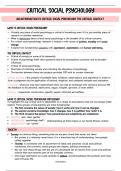→ Virtually any piece of social psychology is critical of something even if it is just another piece of
research or another researcher.
→ What is distinctive about critical social psychology is the breadth of its critical concerns.
→ For critical social psychology, research is locked in with issues of politics, morality and social
change.
→ It starts from fundamental concerns with oppression, exploitation and human well-being.
• Critical of society (or some of its elements).
• Critical of psychology itself: asks questions about its assumptions, practices and its broader
influences.
• Critical of social psychology.
• Dual task of criticizing society and criticizing the discipline of psychology.
• The tension between these two projects provides CSP with its current character.
Critical thinking - the analysis of available facts, evidence, observations, and arguments in order to
form a judgement by the application of rational, skeptical, and unbiased analyses and evaluation.
Criticism – what you may have experienced when you had an exchange with someone and you felt
the feedback to be personal, destructive, vague, inexpert, ignorant, or even selfish.
Critique - impersonal, constructive, specific, expert, informed and selfless.
To highlight the way critical work is dependent on a range of assumptions that are not always made
explicit. Three groups of assumptions are most fundamental.
1. The first concerns the nature of society: how it works and how it can be changed.
2. The second concerns knowledge: how it changes, how it is justified, how ‘solid’ it is.
3. The third concerns the person: how personhood and subjectivity are understood.
• SOCIETY: race, class, gender
• KNOWLEDGE: psychology itself Understanding all these topics in our South African context
• SUBJECTIVITY: our “selves”
• Society- an obvious thing, something that we are part of and that exists ‘out there’.
→ But society is a relatively recent term; it is a theorized way of understanding, how people
collect together.
→ ‘Society’ is connected with an assortment of ideas and practices: social and political
institutions, the economy, social groups and classes, political procedures.
→ We can ‘see’ these things with the aid of a developed set of notions from social and political
science that have become part of our everyday currency.
→ One major alternative we could consider is culture- would emphasize the symbolic and ritual
side of human life.
TJW NOTES
, → For a critical social psychologist the problem with the notion of culture is its organic, timeless
connotations.
→ Society, with its associated thesaurus of notions, is a way of constructing stuff that makes it
more malleable, makes it something that can be transformed or overturned.
• One of the crucial things marking out different views of society is how they view individuals.
• Liberal models of society tend to take the individual as logically prior to society.
• Thus, society will be fair if it allows people the freedom to pursue their own goals.
• From a critical perspective, adopting a liberal view will lead to emphasis on tackling problems at
an individual level rather than focusing on political structures and institutions.
• The critical aim is the emancipation of the individual.
• Sees group processes as independent of broader political structures and institutions.
• Eg. Most social psychology texts.
• Critical social psychology is usually suspicious of the liberal individualist view of society.
LIBERALISM
⇒ an attitude characterized by acceptance of alternative, even noncompliant, forms of thinking or
acting and sometimes (but not necessarily or fully) by advocacy of change to the status quo and
tradition.
⇒ historically, a broad political philosophy emphasizing individual freedom, constitutional
government, and social progress through open debate and the pragmatic reform of existing
institutions and laws.
• Marxist theories of society emphasize the importance of historical change, and the centrality of
class conflict.
• In particular, social class is seen as a fundamental factor in making sense of social structures–
power relations are often understood in terms of class relations.
• From a Marxist perspective, to be critical and political necessarily involves particular ways of
making sense of social structures and institutions.
• The institutionally supported structures of power are often viewed as pre-discursive–they exist as
part of the ‘real’–so we can start to see how a theory of knowledge (e.g. realist versus relativist)
impacts on our understanding of society and social change.
• If social structures can simply exist outside our ways of making sense of them, we are forced into
thinking about personhood in particular ways.
• These tensions between what is individual and social, what is real and discursive, provide a great
deal of dynamism and debate for critical social psychologists.
• Society precedes the individual.
• A postmodern theory of society is a way of characterizing contemporary society and the
degeneration of capitalism and modernity.
• This emphasizes the importance of the move away from mass industrial production towards new
information-based technology in which control of communication is paramount.
• Focuses on language and communication.
• Unlike Marxism, critical analysis presupposes no primary political structures; unlike liberalism, the
individual is not assumed to be prior to social and institutional structures.
→ Sees social institutions as constituted through language.
TJW NOTES





